Department JEDI Committee Updates
Spring Town Hall Meeting
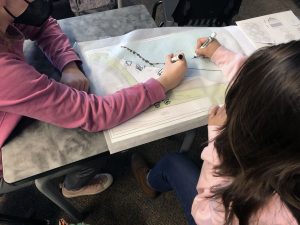
The Dept JEDI Committee is organizing a department-wide Town Hall event this April to consider how to center JEDI work in Landscape Architecture. This will be an opportunity for all of us to come together as a community to discuss how to incorporate JEDI work into our field and consider how justice and equity relate to our focus on Urban Ecological Design. Members of our PAC will also be there. This is an important opportunity to help shape the direction of the department. Stay tuned for updates!
UWLA Department JEDI News
Student Feature
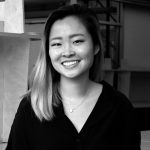
Third-year MLA student, Stephanie Roh completed a Valle Scholarship in Scandinavia in Autumn 2021. Her project, “Space For Us: Designing Landscapes of Belonging for Immigrants in Copenhagen + Malmö” focuses on the role of public space in helping immigrants feel welcome in their new homes. Stephanie notes, “I decided to study this topic at the intersection of landscape architecture and immigration based on my growing passion for landscape justice issues as well as my previous experience as an exchange student in Copenhagen in 2018, where I became aware of the struggles that immigrants face in Danish society.
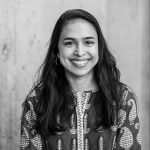
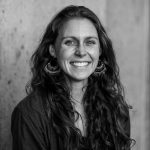
As part of their Spring 2021 Ecological Systems studio, second-year MLA students, Seyyada Burney + Lauren Corn, explored the complicated history of Seattle’s largest city park. Their project, “Fenced In/ Locked Out: Social Justice in Seattle’s Discovery Park” is a StoryMap that “combines archival research on the histories of Discovery Park with site observations taken inside and along the edges of the Park – this boundary is at times porous, and at others, fiercely defended at the expense of equity and justice. A short concluding animation conveys how a combination of park policies and neighborhood group pressure continues to obstruct ethnic and racial diversity in this area.”
Alumni Feature
Jocine Velasco (MLA ’21), Rhys Coffee (MLA ’23), and Ken Yocom are working closely with the Burke Museum, the UW Native American Advisory Board, UW Grounds and Maintenance, and the design firm GGN to study the health and viability of a camas meadow recently designed and installed at the Burke Museum on the UW campus. The collaboration is working to develop interpretive strategies to communicate the importance of this habitat type in the Cascade region for indigeneous communities while also seeking to understand how the community of plants in the meadow responds to different management strategies.
Faculty Feature
Professors Thaïsa Way and Ken Yocom recently published a chapter, “Infrastructural Wilderness: Seattle and the Binding of City and Region” in the new book Urban Cascadia and the Pursuit of Environmental Justice (2021,UW Press) edited by Nik Janos and Corina McKendry
In Sept 2021, Professor Jeff Hou and colleagues produced a report from their CELA (Council of Educators in Landscape Architecture) panel last year, “Decolonizing Landscape Architecture Education.” You can find the reports here: Part 1 and Part 2.
Professor Lynne Manzo will be presenting at the CELA 2022 conference later this month with Inye Wokoma, Founding Director of Wa Na Wari, and Dr. Kristin McCowan, University of St. Louis to discuss their research and community organizing efforts for Black homeowners and artists in Seattle’s Central District.
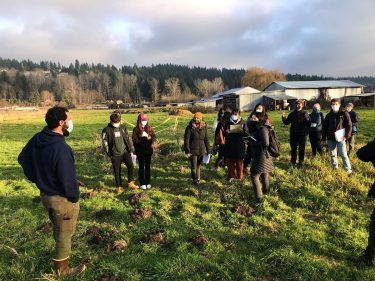
Curriculum Corner
Kristi Park and Tim Lehman on L ARCH 502A The Farm Studio
The “Farm Studio” included an in-depth look at food cultivation focused on a peri-urban, 12 acre site in Woodinville, WA. Students were given the freedom to deep dive on many topics related to the food systems including community building, equitable access to food, public policy, land-use law, agricultural education, and climate resilience. This course also explored the journey of food systems from a global perspective investigating everything from child-labor involved in the production of chocolate to water-rights and social injustices resulting in crops such as avocados.
CBE Diversity Council Updates
CBE BIPOC Lunch: On Wednesday, February 23rd, the College of Built Environments’ Diversity Council hosted its first BIPOC Student Lunch at the Samuel E. Kelly Ethnic Cultural Center on Wednesday, February 23. The aim of the lunch was to provide a fun, inclusive space for BIPOC students from the different CBE disciplines to meet and converse.
The lunch was a great success! We had a lively group of folks from all departments and we look forward to hosting another BIPOC student lunch in the Spring quarter. Thank you to those of you from the LARCH Department that RSVP’d and were able to join us! We hope to have even more people attend next quarter, so keep an eye out for details coming to you soon!
Cohort Hire Updates: The CBE Diversity Council has taken an active role in the College’s faculty cohort hiring process. The Council worked with Ken Yocom as the head of the CBE Cohort Hiring Committee to ensure that the evaluation criteria used to assess each applicant’s qualifications included items about whether and how they address issues of social justice, equity, diversity and inclusion. This was an important way to express our commitment to JEDI concerns and ensure new faculty share those values.
In addition, at least one member of the Diversity Council attended each of the 21 candidate presentations that were hosted across the five college departments to ask candidates how they see their work advancing efforts of justice and equity in their discipline and why they feel this work is important. Finally, the post-talk surveys that all CBE members were invited to complete after each candidate’s public presentation included questions around the perceived strengths and weaknesses in furthering the College’s equity, diversity, and inclusion efforts through their work.
EDIfy: The Inaugural College EDI Film Festival! Coming this Spring
This May, the College Diversity Council will be launching its first mini Film Festival! EDIFY will feature several short films in an uplifting celebration of the possibilities that diverse ideas and communities can bring. This event will be open to all members of the CBE Community. Be on the lookout for more details at the start of Spring quarter!
EDIfy (ˈɛdɪˌfaɪ)
- to instruct in such a way as to improve, enlighten, or uplift morally, spiritually, or intellectually
- Archaic to build; establish
UWASLA Updates
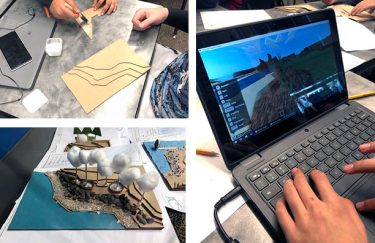
The UW Diversity Seed Grant funded the project “Empowering BIPOC Youth: Pathways to Sustainable Design Futures” under the leadership of UWASLA Youth Outreach Chair Maria Arevalo (BLA ‘23). Maria has continued to work with students of Proyecto Saber at Denny International Middle School (see our last newsletter for a recap of the first session). Fellow UWASLA students Erin Irby (MLA ‘22), Heewon Kim (BLA ‘22), Isa Lewis (BLA ‘23), and Katie Rankin (BLA ‘23) helped support curriculum development and presentations in three additional sessions in January and February. These lessons focused more specifically on social and water justice issues in the context of their design site, Jack Block Park. These workshops empowered students to design and present interventions that respond to critical needs they’ve self-identified using either physical and/or digital models built in Minecraft. Our UWASLA team reports that creative engagement was high because of the ability to apply critical thinking to a real world site – once students were introduced to both processes and tools to map out spatial design goals, they had very clear objectives and oftentimes unique and surprising interests they wanted to pursue. Read on to see how you can participate in future events!
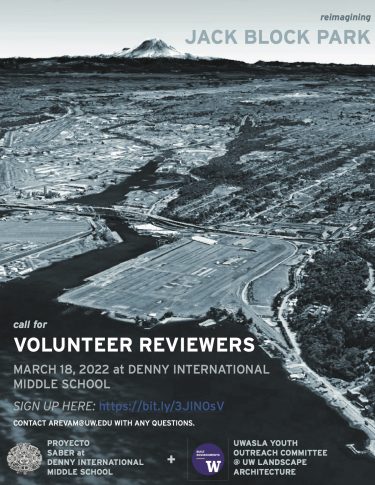
Proyecto Saber Mock Studio Presentations – Call for Reviewers!
We are reaching out to current students and professionals to join us on the students final presentation day on March 18, 2022 8:30am-3:00pm at Denny International Middle School. Reviewers are asked to commit to class times (google form signup), as they will be changing every 50 minutes. The format of this event is a gallery walk where reviewers interact with students and leave comments on projects. As this is the first introduction and exposure to Landscape Architecture and design professionals for many of these students, we ask that reviewers support this exploratory phase by centering focus and curiosity on student priorities and interest.
What: Call for Reviewers
When: March 18, 2022 @8:30-3:00pm (1 hour commitment minimum – signup for time slots)
Where: Denny International Middle School – 2601 SW Kenyon St, Seattle, WA 98106
Why: To provide support and learn about youth interest and needs for their community.
How: Gallery walk style presentation for each class period (50 minutes), where reviewers are welcomed to interact and engage with students and projects. As reviewers you are welcomed to commit to the whole schedule or select times that work best for you (see google form)
If you are interested in becoming a reviewer please fill out the google form below. If you have any questions please contact Maria Arevalo at arevam@uw.edu
CALL FOR REVIEWERS GOOGLE FORM
Online Resources
Nakani Native Program
Barriers to Revitalizing PNW Traditional Food Cultures Seminar recording and more.
EPA Launches EJScreen 2.0, Updating the Community Environmental Justice Mapping Tool
*Excerpted EPA announcement
The U.S. Environmental Protection Agency (EPA) has updated and redesigned EJScreen, the Agency’s publicly available, award-winning environmental justice (EJ) screening and mapping tool. The redesigned tool, which has been named “EJScreen 2.0”, makes important improvements to better meet the needs of users and provides expanded insight into potential EJ concerns in overburdened communities. The update features new indicators on environmental burdens, socioeconomic factors, climate change, health, and critical service gaps.
Also today, the White House Council on Environmental Quality released its Climate and Economic Justice Screening Tool (CEJST). Learn more about the CEJST.
Upcoming Events
 Undocu Week
Undocu Week
Leadership Without Borders
March 7-11, 2022 | 5-7 PM
Undocu Week is hosted by Leadership Without Borders (LWB) and consists of a series of weeklong events that provide knowledge, resources and more to the UW community and beyond! This is the week’s itinerary—all events will be from 5-7pm in the ECC Unity Suite!
There will be fun prizes at select events that include Undocu Week swag, music, food and more! We welcome everyone to join us as immigration is an intersectional issue that impacts ALL communities. Keep an eye out for more information about each even on Instagram. We can’t wait to see you all, come join us!
Winter 2022 Critical Race Theory Trilogy
The Resiliency of CRT: Surviving Through Truth
with Edwin Lindo, Associate Teaching Professor and Assistant Dean for Social & Health Justice, UW School of Medicine
THURS March 10 | 6:30 pm
Register here – for one or all three lectures
Join the Office of Public Lectures this quarter for a trilogy of talks on Critical Race Theory, featuring UW faculty and staff experts as they share their research. All talks will be held in-person at Seattle Town Hall at 6:30 p.m. We do plan to rebroadcast each event on our YouTube channel at the conclusion of the series.
Historic Foundation Preservation Awards Series: Wa Na Wari
FRI Mar 11 | 3:30 – 5 p.m.
Cost: $5 members / $10 general public
Historic Seattle is excited to launch a new program series highlighting a handful of our 2020 and 2021 Preservation Awards Winners. This series runs from February 22 to March 12 and includes virtual and in-person events. We look forward to learning more about these incredible preservation projects from the project teams!
Wa Na Wari | 2020 Community Advocacy Award
Wa Na Wari is an active center for Black art and culture sited in a 5th-generation Black-owned home in Seattle’s Central District. By providing space and resources for Black artists to collaborate, exhibit their work, and network with other artists, collectors, and patrons, Wa Na Wari is advancing the community in the face of such challenges. To support their ongoing efforts in homeowner advocacy, Wa Na Wari also received a $3,000 Community Advocacy prize alongside this award.We look forward to this in-person tour of Wa Na Wari and its current art exhibits facilitated by Founder & Land Steward Inye Wokoma and Founder & Curator Elisheba Johnson.
Queer Trans Ecologies and River Justice
FRI Mar 11 | 7:30 – 8:30 p.m.
Seattle Town Hall
Register here – Tickets are available for $5
From the grasslands of the Columbia Plateau to the rich valleys west of the Cascade Mountains, There are over 70,000 miles of rivers in Washington state. Rivers are vital to our region’s ecosystems, hosting a wide diversity of living things in their waters and along their banks – our beautiful state would not be what it is without our waterways. How might we better understand rivers and ensure their vitality now, and in the future?
According to queer-trans-feminist river scientist Cleo Wölfle Hazard, the key to our rivers’ futures requires centering the values of justice, sovereignty, and dynamism. Wölfle Hazard’s new book, Underflow: Queer Trans Ecologies and River Justice, meets at the intersection of river sciences, queer and trans theory, and environmental justice, and explores river cultures and politics at five sites of water conflict and restoration in California, Oregon, and Washington.
Incorporating work with salmon, beaver, and floodplain recovery projects, Wölfle Hazard weaves narratives about innovative field research practices with a queer and trans focus on love and grief for rivers and fish. Wölfle Hazard frames the book with the concept of underflows — important, but unseen parts of a river’s flow that seep down through the soil or rise up from aquifers deep underground. Wölfle Hazard explains that there are underflows in river cultures, sciences, and politics, too, where Native nations and marginalized communities fight to protect rivers.
In discussion with UW associate professor Stephanie Clare, Wölfle Hazard describes why rivers matter for queer and trans life and how science can disrupt settler colonialism.
Cleo Wölfle Hazard (he/him, ze/hir, they/them) is assistant professor in the School of Marine and Environmental Affairs at the University of Washington, coauthor of Thirsty for Justice: A People’s Blueprint for California Water, and coeditor of Dam Nation: Dispatches from the Water Underground. Wölfle Hazard was part of an EarthLab Innovation Grant project in 2021.
…But Now I See: Using the Lens of Racial Literacy to Understand Racial Trauma and Promote Justice and Healing
MON March 14 | 7:00 – 8:30
Register here
Despite its tragic arc, the so-called “double pandemic” has served as an awakening to the realities of racial injustice across a number of systems. On one front, the pandemic of COVID-19 disproportionately impacted Black adults and youth, both physically and psychologically. Meanwhile, we have borne witness to another pandemic, dating back to 1619, which has been a reminder that racism is “alive and sick”. Justice and healing in the face of the insidiousness of racism in its myriad forms require recognizing how it expresses across the lifespan. In this presentation, I will discuss racial literacy as a tool for recognizing racial trauma across a number of systems and life stages. Collectively, we will reflect on how racial seeing and racial noticing are important elements in our mission towards social justice.
Resistance Through Resilience – ft. Dr. Bonnie Duran
TUES March 15 | 6:00–7:00 p.m. PDT
Register here
Join public health researcher and Buddhist mindfulness teacher Dr. Bonnie Duran as she discusses the important community health implications of contemplative practice. With grounding in trauma-informed and systemic perspectives, this talk will explore the avenues for public health practice that empower and reinforce resilient communities.
The Livestream link will be emailed to registered attendees one day prior to the lecture date.
Our Blue Planet: Global Visions of Water Exhibit
MAR 18 – MAY 30
Seattle Art Museum Exhibit Link
Dive into the expanse of Our Blue Planet: Global Visions of Water. Experience art that ripples out from the museum galleries to the edges of our world, as artists across centuries and continents explore how art helps us understand the significance of water. In response to one of Earth’s most vital natural resources, artworks created in 618 AD are presented alongside contemporary works so new, they were finished in preparation for this exhibition. The more than 80 paintings, sculptures, films, photographs, and textiles on view are drawn from SAM’s collections and loans from local collectors. The 74 artists represented hail from 17 countries and seven Native American tribes making this exhibition a unique opportunity to cross the seas connecting global communities and see how artists grapple with the past, present, and future of water in our world.
Meet Indigenous scientists and authors of Fresh Banana Leaves & Pollution is Colonialism
THURS March 24 | 11:30am PST / 4pm NST
Register here
*Our very own Jamilah Williams will be co-moderating this event!
We invite you to be in community with Dr. Jessica Hernandez (Fresh Banana Leaves and S2 Board of Directors) and Dr. Max Liboiron (Pollution is Colonialism), in a discussion moderated by S2 board members Jasleena Grewal and Jamilah Williams.
Dr. Jessica Hernandez draws from Maya Ch’orti’ family in El Salvador and Zapotec family in Oaxaca, Mexico, and an upbringing that’s taken her to doctoral interdisciplinary work that itself addresses interdisciplinary, holistic relations, from marine science to forest study.
Her work has figured in both academia and in community, including founding an environmental consulting and aretsanias hybrid business, Pina Soul SPC, and as a member of Sustainable Seattle’s Board of Directors where she helped the organization establish a special fund for Indigenous Leadership and has hosted several discussions about trans-national Indigenous knowledge on climate change.
Dr. Max Liboiron is a leader in both developing and promoting anticolonial research methods into a wide array of disciplines and spaces. As founder of CLEAR, an interdisciplinary plastic pollution laboratory whose methods foreground humility and good land relations, Liboiron has influenced national policy on both plastics and Indigenous research, invented technologies and protocols for community monitoring of plastics, and created protocols for fostering research collectives. Dr. Liboiron’s book has been a resource for Sustainable Seattle in pre-development work around local community-led initiatives addressing pollution and policy.